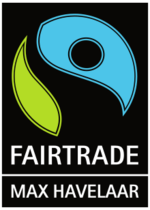- Stichting Max Havelaar
-
Stichting Max Havelaar Type Non-profit organization Founded 1988 Headquarters Utrecht, Netherlands Key people Peter d'Angremond, Director since july 2009 Website www.maxhavelaar.nl/ Stichting Max Havelaar (or the Max Havelaar Foundation in English) is the Dutch member of FLO International, which unites 23 Fairtrade producer and labelling initiatives across Europe, Asia, Latin America, North America, Africa, Australia and New Zealand. Several of these corresponding organizations in other European countries also use the Max Havelaar name. The name comes from Max Havelaar, which is both the title and the main character of a Dutch 19th-century novel (written by Multatuli) critical of Dutch colonialism in the Dutch East Indies.
The Max Havelaar label, the world's first Fairtrade Certification Mark, was officially launched by Stichting Max Havelaar on 15 November 1988, under the efforts of Nico Roozen, Frans van der Hoff and Dutch ecumenical development agency Solidaridad. The label, used to distinguish Fairtrade products from conventional ones, aims to improve "the living and working conditions of small farmers and agricultural workers in disadvantaged regions".[1] The first fairly traded coffee originated from the UCIRI cooperative in Mexico and was imported by Dutch company Van Weely, roasted by Neuteboom, before being sold directly to worldshops and, for the first time, to mainstream retailers across the Netherlands.
Today, Fairtrade products are available in several Dutch supermarket chains such as Jumbo, which sells an average of 18 Fairtrade products per store and Super de Boer, which sells an average of 17 products per store. Fairtrade products are also available at Albert Heijn supermarkets across the Netherlands.[2]
In 2006, Fairtrade labelled sales in the Netherlands amounted to € 41 million, a 12 % year-to-year increase.[3]
Court case against the province of Groningen
The Dutch province of Groningen was sued in 2007 by Dutch coffee supplier Douwe Egberts for explicitly requiring its coffee suppliers to meet fair trade criteria set by Stichting Max Havelaar, most notably the payment of a minimum price and a development premium to producer cooperatives. Douwe Egberts, which sells a number of coffee brands under self-developed ethical criteria, believed the requirements were discriminatory. After several months of discussions and legal challenges, the province of Groningen prevailed in a well-publicized judgement in favor of the province. Coen de Ruiter, director of Stichting Max Havelaar, called the victory a landmark event: "it provides governmental institutions the freedom in their purchasing policy to require suppliers to provide coffee that bears the fair trade criteria, so that a substantial and meaningful contribution is made in the fight against poverty through the daily cup of coffee".[4]
References
- ^ Max Havelaar | Max Havelaar
- ^ Zibb.nl (2006). Plus verslaat AH met bio-assortiment URL accessed on November 8, 2006.
- ^ Fairtrade Labelling Organizations International (2007). Figures. URL accessed on October 9, 2007.
- ^ Max Havelaar Foundation (2007). [85.82.218.199/fileadmin/Bruger_filer/Dokument_database/IKAvaerktoej/EU_siden/Max_Havalaar.pdf Dutch Province of Groningen wins summary brought by Doug Egberts and can continue specifying fair trade coffee]
External links
Fair trade Core topics Federations Fairtrade Labelling Organizations International · World Fair Trade Organization · Network of European Worldshops · European Fair Trade Association · FINE · Fair Trade Federation · International Resources for Fairer Trade (IRFT)Certification Labeling initiatives Asociación del Sello de Productos de Comercio Justo · Fair Trade Association of Australia and New Zealand · Fairtrade Mark Ireland · The Fairtrade Foundation · Association Max Havelaar France · Stichting Max Havelaar · Max Havelaar-Stiftung Switzerland · Fairtrade Canada · Fair Trade USA (formerly TransFair USA)Alternative trading
organizationsCampaigns Media  Category:Fair trade ·
Category:Fair trade ·  Fair trade media at CommonsCategories:
Fair trade media at CommonsCategories:- Fair trade organizations
- Foundations based in the Netherlands
- Organizations established in 1988
Wikimedia Foundation. 2010.

